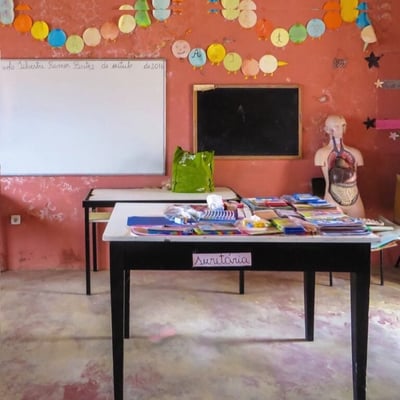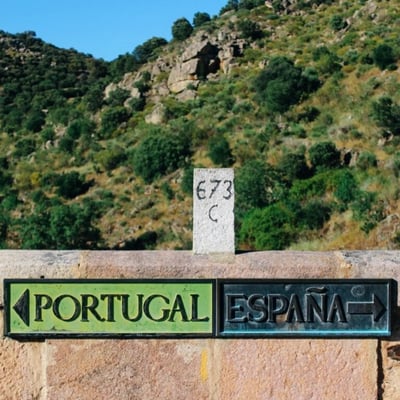1
00:00:03,226 –> 00:00:09,932
Cliente: Com licença, estou à procura de uma coisa, mas não a encontro. Pode ajudar-me?
{{Customer: Excuse me, I’m looking for something, but I can’t find it. Can you help me?}}
2
00:00:10,416 –> 00:00:12,623
Empregada: Sim, claro. O que é que procura?
{{Employee: Yes, of course. What are you looking for?}}
3
00:00:13,256 –> 00:00:16,989
Cliente: Estou à procura de açúcar mascavado.
{{Customer: I’m looking for brown sugar.}}
4
00:00:17,646 –> 00:00:20,427
Empregada: Desculpe, não temos açúcar mascavado.
{{Employee: Sorry, we don’t have any brown sugar.}}
5
00:00:20,926 –> 00:00:22,663
Cliente: Ai, que pena.
{{Customer: Oh, what a shame.}}
6
00:00:23,296 –> 00:00:26,071
Empregada: Mas temos açúcar branco e açúcar amarelo.
{{Employee: But we have white sugar and yellow sugar.}}
7
00:00:26,446 –> 00:00:29,616
Estão no corredor dos ingredientes para pastelaria.
{{They are in the bakery ingredients aisle.}}
8
00:00:30,076 –> 00:00:31,991
Cliente: Ingredientes para pastelaria?
{{Customer: Bakery ingredients?}}
9
00:00:32,436 –> 00:00:36,525
Empregada: Sim… Farinha, açúcar, chocolate, essas coisas…
{{Employee: Yes… Flour, sugar, chocolate, those things…}}
10
00:00:36,856 –> 00:00:40,636
É aquele corredor ali, ao lado das especiarias.
{{It’s that aisle over there, next to the spices.}}
11
00:00:41,156 –> 00:00:44,325
Cliente: Ah, estou a ver. Obrigado pela sua ajuda!
{{Customer: Ah, I see. Thanks for your help!}}
12
00:00:44,856 –> 00:00:45,497
Empregada: De nada.
{{Employee: You’re welcome.}}
13
00:00:46,216 –> 00:00:48,606
Cliente: Desculpe, tenho outra pergunta.
{{Customer: Sorry, I have another question.}}
14
00:00:49,146 –> 00:00:49,611
Empregada: Diga.
{{Employee: Go ahead.}}
15
00:00:50,036 –> 00:00:58,403
Cliente: Há muitos tipos de farinha. Eu quero aquela que é igual a, em inglês, “all-purpose flour”.
{{Customer: There are many kinds of flour. I want the one that is equal to, in English, “all-purpose flour”.}}
16
00:00:59,296 –> 00:01:09,972
Vejo “tipo 45”, “tipo 55”, “tipo 65”, etc. Qual é a diferença?
{{I see “type 45”, “type 55”, “type 65”, etc. What’s the difference?}}
17
00:01:10,486 –> 00:01:16,428
Empregada: Sim, há muitos tipos. Eu explico. Tipo 45 é farinha flor.
{{Employee: Yes, there are many types. I’ll explain. Type 45 is pastry flour.}}
18
00:01:16,876 –> 00:01:19,239
É uma farinha muito branca e refinada.
{{It is a very white and refined flour.}}
19
00:01:19,646 –> 00:01:27,629
É boa para sobremesas leves e fofas. Ou para massa fresca! Tipo 55 é farinha super-fina.
{{It’s good for light and fluffy desserts. Or for fresh pasta! Type 55 is super fine flour.}}
20
00:01:28,166 –> 00:01:35,684
É melhor para bolos, tartes, e pastelaria. É como “soft flour” ou “cake flour”, em inglês.
{{It is best for cakes, pies, and pastries. It’s like “soft flour” or “cake flour” in English.}}
21
00:01:36,196 –> 00:01:44,460
Tipo 65 é farinha fina. É melhor para pão, mas também pode utilizá-la para bolos, tartes, e pastelaria.
{{Type 65 is fine flour. It’s better for bread, but you can also use it for cakes, pies, and pastries.}}
22
00:01:44,776 –> 00:01:52,825
É como “strong flour” ou “bread flour”. Tipo 80 e tipo 110 são farinhas semi-integrais.
{{It is like “strong flour” or “bread flour”. Type 80 and type 110 are semi-whole wheat flours.}}
23
00:01:53,086 –> 00:01:58,305
Estas farinhas são utilizadas para fazer pão que contém alguns grãos inteiros.
{{These flours are used to make bread that contains some whole grains.}}
24
00:01:59,036 –> 00:02:04,855
Tipo 150 é a farinha integral. Faz um pão mais escuro e mais denso.
{{Type 150 is whole wheat flour. It makes a darker and denser bread.}}
25
00:02:05,436 –> 00:02:13,024
Cliente: Hmm, não entendi a última. Como é que se diz “farinha integral” em inglês?
{{Customer: Hmm, I didn’t understand the last one. How do you say “farinha integral” in English?}}
26
00:02:13,546 –> 00:02:16,069
Empregada: Acho que se diz “whole wheat flour”.
{{Employee: I think it is “whole wheat flour”.}}
27
00:02:16,616 –> 00:02:18,439
Cliente: Já percebi.
{{Customer: I get it now.}}
28
00:02:18,946 –> 00:02:24,676
Empregada: Se quiser a farinha mais versátil, use o tipo 55 ou o tipo 65.
{{Employee: If you want the most versatile flour, use type 55 or type 65.}}
29
00:02:25,156 –> 00:02:28,206
Podem ser utilizadas na maioria das receitas.
{{They can be used in most recipes.}}
30
00:02:28,876 –> 00:02:34,924
Cliente: Parece-me bem. Olhe, já agora, e isto do fermento?
{{Customer: Sounds good. Look, by the way, what about this ‘fermento’ thing?}}
31
00:02:35,936 –> 00:02:41,411
Alguns pacotes dizem “Com fermento” e outros dizem “Sem fermento”.
{{Some packages say “with yeast” and others say “without yeast”.}}
32
00:02:42,106 –> 00:02:46,222
Empregada: “Com fermento” significa que contém, em inglês, “yeast”.
{{Employee: “With yeast” means it contains, in English, yeast.}}
33
00:02:46,436 –> 00:02:49,320
“Sem fermento” não contém “yeast”.
{{“Without yeast” does not contain yeast.}}
34
00:02:49,896 –> 00:02:53,142
Cliente: Faz sentido. Muito obrigado pela ajuda.
{{Customer: Makes sense. Thanks a lot for your help.}}
35
00:02:53,726 –> 00:02:56,971
Empregada: De nada. Posso ajudá-lo a encontrar mais alguma coisa?
{{Employee: You’re welcome. Can I help you find anything else?}}
36
00:02:57,476 –> 00:03:02,954
Cliente: Não, não preciso de mais nada. Boa tarde! Continuação de um bom dia!
{{Customer: No, I don’t need anything else. Good afternoon! Have a good day!}}
37
00:03:03,386 –> 00:03:05,169
Empregada: Boa tarde! O mesmo para si!
{{Employee: Good afternoon! The same to you!}}
 We respect your privacy and have a ZERO TOLERANCE for spam.
We respect your privacy and have a ZERO TOLERANCE for spam.
















Muito útil! Agora finalmente entendi a diferença entre as farinhas. Obrigada. Beijinhos
I’ve noticed that sometimes European Portuguese uses the conjugated form of estar + a + noun instead of conjugated form of estar + a + infinitive. The meaning appears to be the same, namely the present progressive. For example, “Estou a esperar” versus “Estou a espera” and, in this clip. “Estou a procurar” versus “estou à procura.”
1. Are these forms completely interchangeable?
2. Does the form conjugated estar+ à + noun exist for many other verb/nouns combinations other than esperar and procurar?
Olá, Jay!
1. They are interchangeable, as long as you form the full sentence properly with each construction. For example: “Estou à procura do livro”, but “Estou a procurar o livro”. Basically, pay attention to the prepositions (or their absence) in each case.
2. Not many, I think. Just from memory, here are a few other common combinations:
– Estar à caça / estar a caçar (hunting)
– Estar em busca / Estar a buscar (searching)
– Estar na luta / Estar a lutar (fighting -> “na luta” is not that used for actual physical fights, I think, but more like fighting for an ideal or a goal)
– Estar à espreita / Estar a espreitar (peeking or, sometimes, searching/spying)
They’re not even all with “à”, hah.
LOL … Acabei de ver a farinha na minha cozinha. Tipo 65! Nunca tinha reparado neste número!!! Tinha acredito a única diferência era sem e com fermento. Aprendi muito hoje!!!
Hi I have a question more around shop etiquette! I noticed the customer got the attention of the shop assistant by using ‘com licença’ which makes perfect sense to me except I have found shop assistants to be a little indignant if I don’t precede my initial approach with a ‘Bom dia’ or ‘boa tarde’. I know this is perfectly normal, or rather the expection when entering a small shop but it also seems to be the case in large shops like supermarkets and DIY stores when you approach an assistant in the aisles. Admittedly I have never tried using just ‘Com licença’. Is my perception correct or have I misread the situation. (I have to confess I am a little nervous of using ‘Com licença’.. whenever I do it seems to provoke an excessive reaction with people virtually jumping out of my way!)
Starting with a greeting is always nice 🙂 “Com licença” can be used, but it’s true that it can be mistaken for a “get out of the way”, hah. Personally, if I need to ask something to a stranger, I usually use”desculpe” to get their attention instead (and also to apologize in advance for invading their space).
I was touched by your dedication to help us to really get into the practicalities. I have done many other courses, like babbel etc, but these I found so mechanistic. In yours I detect dedication and much love, thank you, it is so fun!
Self-raising flour does not contain yeast, fermento, it contains baking powder which is fermento em pó